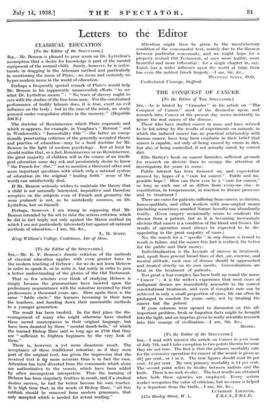THE CONQUEST OF CANCER [To the Editor of TIIE SPECTATOR.]
SIR,—As is hinted by " Crusader " in his article on " The Conquest of Cancer," most of the discussion upon, and research into, Cancer at the present day seems insistently to ignore the real causes of the disease.
Those who have studied cancer in man, and have refused to be led astray by the results of experiments on animals, in which the induced cancer has no practical relationship with human cancer, have long been emphatic in their belief that cancer is capable, not only of being caused by errors in diet, but also of being controlled, if not actually cured, by correct diet.
Ellis Barker's book on cancer furnishes sufficient grounds for research on dietetic lines to occupy the attention of investigators for years to come.
Public interest has been focussed on, and expectation aroused by, hopes of a " cure for cancer." Futile and im- possible hope ! How can there ever be a " cure for cancer," so long as each one of us differs from everyone else—in constitution, in temperament, in reaction to disease processes and to treatment ?
There are cures for patients suffering from cancer, as dictists, homoeopathists, and other workers with non-surgical means (including sometimes unaided Nature herself) can abundantly testify. (Even surgery occasionally seems to eradicate the disease from a patient, but as it is becoming increasingly obvious that cancer is a condition of the blood and tissues, the results of operation must always be expected to be dis- appointing in the great majority of cases.) No, the search for a " specific " in any disease is bound to result in failure, and the sooner this fact is realized, the better for the public and their money.
Individualization is the keynote of success in treatment, and, apart from general broad lines of diet, air, exercise, and mental attitude, each case of disease should be approached and treated strictly on its own merits. Generalizations are fatal in the treatment of patients.
Too great a fear-complex has been built up round the name " Cancer " ; it is the writer's experience that most cases of malignant disease are immediately amenable to the correct constitutional treatment, and even if complete cure can be achieved in only a small proportion of cases, life can often be prolonged in comfort for years—only, not by treating the cancer but the patient.
. If your columns were opened to discussion on this all- important problem, fresh or forgotten facts might be brought into the light, and an impetus given to really scientific research into this scourge of civilization.—I am, Sir, &c., Munoc.




































 Previous page
Previous page